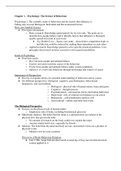Essay
Applied math 1201B essays
- Course
- Psychol 1000 (APPLMATH1201B)
- Institution
- University Of Western Ontario (UWO )
This document has both essays that are to be written in Applied Math 1201B. It is very useful to see as the professors are quite vague with the requirements for the assignment and how to perform well on them.
[Show more]



